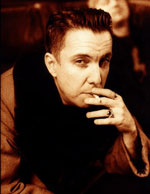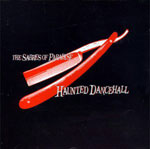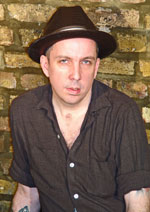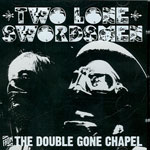
Domino Records has been phenomenally successful. A few of its artists have succeeded in setting the world alight, even if they have passed me by. A few of its records have lit up my life, although the world at large may not have even noticed that they existed.
Domino put out a series of Pram records, for which I’ll be eternally grateful. It also put out a record called Coffee Shop Rules by MFA which I love dearly. MFA is the Midnight Funk Association, a working tile for techno mavericks Mark Broom and Dave Hill, who have previous connecting them back to Mo’Wax and the Excursions series. In some ways their re-emergence on Domino was as exciting as the resurfacing of Davy Henderson with the Fire Engines.
Coffee Shop Rules sounds like the background music from the coffee shop of your dreams. And therein almost lies the dilemma for MFA. By 2002 when this great record was released their particular brand of edgy atmospheric electronica had almost become background music. But that’s background music in the strangest of ways. Nigh on every corporate commercial, promotional dvd, cutting edge technology ad, and film soundtrack was using something approaching this sort of electronica or drum’n’bass to fill in the spaces and add colour and drama. It became something of an industry, and there’s nothing wrong there. Some good people made some good money for a change. There are some great ironies there though.
When I first really began to get into contemporary electronic music, and things like the bleep sound were opening up new vistas in the late ‘80s, I was making the connection back to people like the Fire Engines even then and making links between their vision of active listening music and the dub sets that came from Jamaica and on to the sets of electronic music that people like Warp started to put out. For anti-social souls like myself who would not dream of going clubbing these active listening/artificial intelligence long players were an absolute joy. The early/mid-‘90s was a great time to be consuming electronic music.

The early-ish Warp releases by the likes of Autechre, Aphex Twin, Black Dog/Plaid, Seefeel, Speedy J (especially Speedy J!), B12, Nightmares on Wax, and LFO were total classics. Best of all though was the work of Andy Weatherall, whose Haunted Dancehall set as Sabres of Paradise remains pretty much my electronic desert island disc. And around that time in the early/mid-‘90s I was wont to say that Weatherall and people after him like Photek (Rupert Parkes) were the equivalent of contemporary mods, producing forward looking music, borrowing influences from all over. The argument still holds water.
Weatherall came through the whole club/warehouse/rave thing, graduating from the Boys Own stable, brandishing impeccable credentials as a remixer for everyone from Primal Scream to Espiritu (and his mix of Conquistador remains a lost classic, and it still makes me walk funny) with influences that stretched way beyond the terraces and nightspots to the industrial sounds of Throbbing Gristle and 23 Skidoo. His tattoos told the tale.
It’s easy to forget that among those early Warp releases were recordings by Richard H Kirk/Sweet Exorcist making explicit connections back to Cabaret Voltaire and the pioneering electronic diy experimentalism that was rife during the punk explosion. The classic twisted pop of the early Cabaret Voltaire singles on Rough Trade, the Human League on Fast, and others by The Normal, Silicon Teens, Robert Rental, Thomas Leer, and especially Throbbing Gristle (United – wow!) set the template for a pop revolution that would have ramifications throughout the world, and traces can still be heard in great pop/r’n’b records by Rihanna, Cassie, and many more I hope. Weatherall was one of the first to make this sort of connection, and his Nine O’Clock Drop compilation of what could be dubbed post-punk before it became a serial brand woke a lot of people up.

Tracing Weatherall’s own roots and routes, the Boys Own collective classic Raise by Bocca Juniors inexplicably wasn’t a hit. Maybe it will be resurrected for an ad. His own Sabres imprint put out some classic recordings, including Secret Knowledge’s Sugar Daddy which was a real gem from an unlikely source (rock roue Kris Needs, one time editor of Zigzag where he championed Suicide, whose influence on people like Weatherall would be phenomenal), but it was his work as Sabres of Paradise for Warp that really made people sit up. And, yes, at the risk of being repetitive records like Haunted Dancehall have worn remarkably well.
It was in fact his slightly later incarnation as part of Two Lone Swordsmen where things really got interesting. Again Warp recordings in this guise like Stay Down and Tiny Reminders, together with the A Virus With Shoes extended play, show Weatherall/Two Lone Swordsmen to be among the great explorers. Interestingly when many of Weatherall’s contemporaries were growing flaccid, blanding out and selling out to the superclubs’ allure, the man himself grew steadily more awkward and abstruse.
The Two Lone Swordsmen recordings made no concession to commercialism and trends. They, however, were part of a second Warp golden age, along with Boards of Canada, Squarepusher, Autechre still and Mira Calix. If Warp would later raise eyebrows by embracing shall we say more traditional and less explicitly electronic music then Two Lone Swordsmen would do it all better on their 2004 set From The Double Gone Chapel, which delighted many from the start with the title’s reference to Jim Dodge’s fantastic novel Not Fade Away. And that novel’s primal essence of r’n’r is reflected in the broadcasts from the Double Gone Chapel, where the connection between punk primitivism (a cover of the Gun Club’s Sex Beat is included) and electronic exploration is successfully made after people like Primal Scream, Death In Vegas and even The Fall had been stumbling towards that sound for such a long time.

Listening back now to some of the early Warp titles their innocence seems shocking, and yes the cascade of commercial and film soundtracks has made some of the blueprints over familiar, and that’s the irony. Of the large number who grew tired of contemporary electronic music as the ‘90s progressed a significant number delved back into history, and deep into the work of the Radiophonic Workshops and the abandoned archives of library music. That whole strange area where music with odd experimental leanings was made to measure for TV shows, adverts, and film soundtracks. Sound familiar?
So will in years to come there be crate diggers delving deep for corporate CDs where a brief burst of clanking, clunking electronic abrasiveness was used to underpin scenes of endeavour and enterprise. Does anyone have an idea of the scores of drum’n’bass scores squeezed under scenes of happy employees admiring new products? Does anyone collect contemporary electronica used as incidental mood music as a goodie chases a baddie across a deserted industrial wasteland? How much money has been made producing this sort of music? How many people bought Coffee House Rules by the Midnight Funk Association?
In the meantime haunted dancehalls still ring with the sound of synths and soul as another reissue of the Peppers’ Pepper Box baroque electronic classic suggests the legacy of bespoke experimentalism will linger on, and new pop somewhere is being created with a startling twist.
© 2006 John Carney